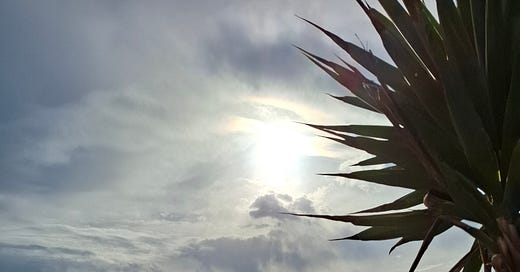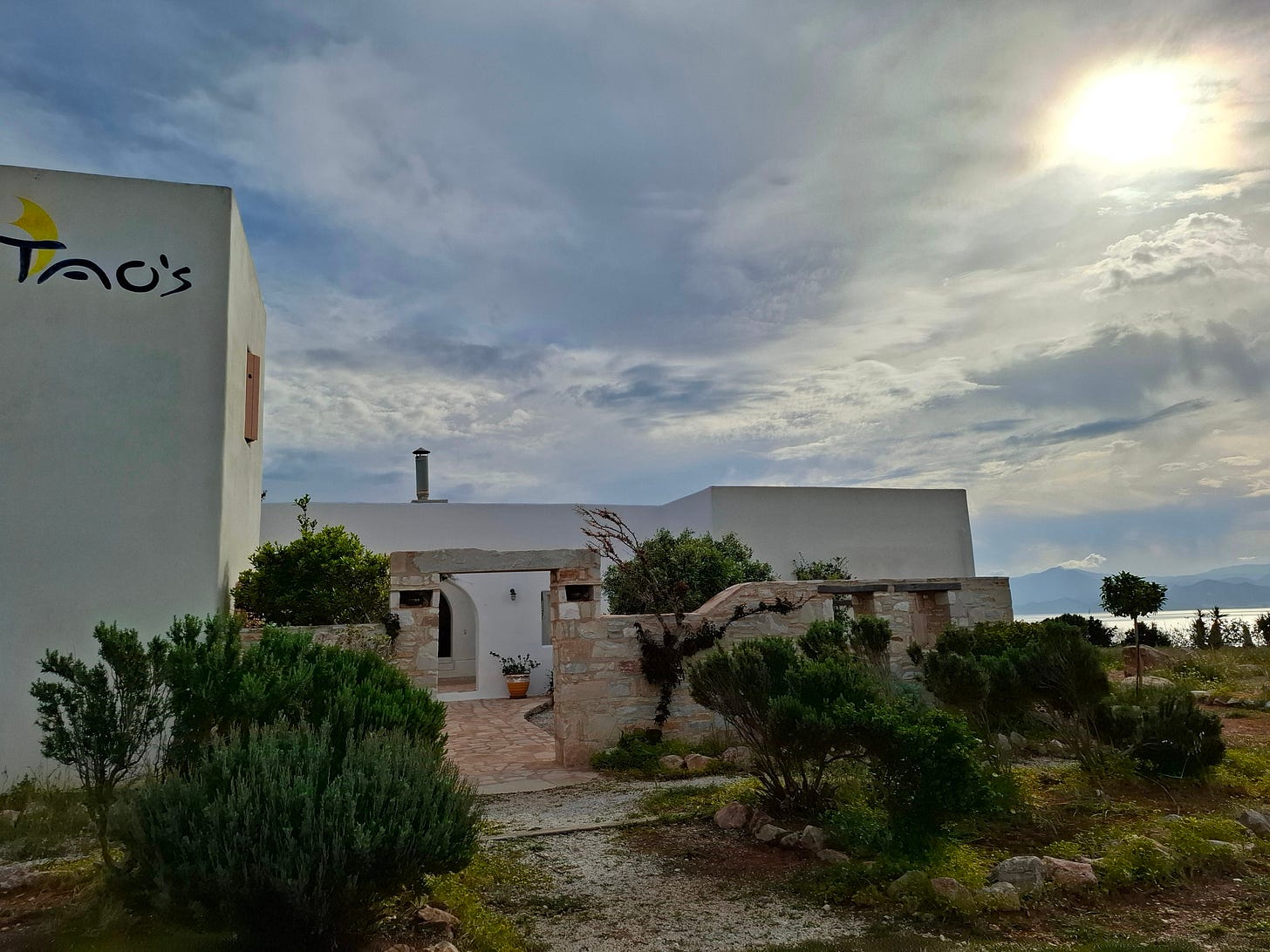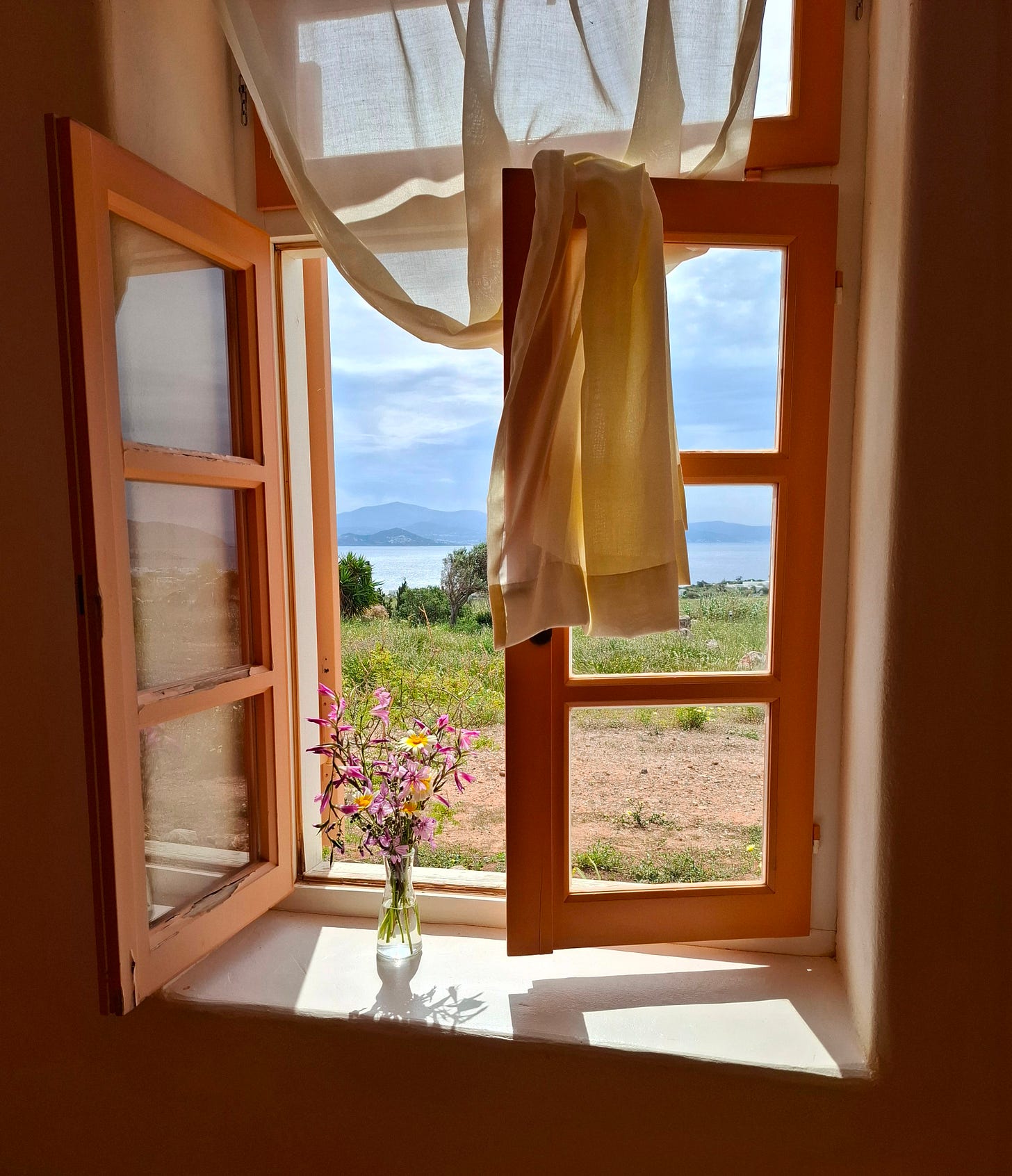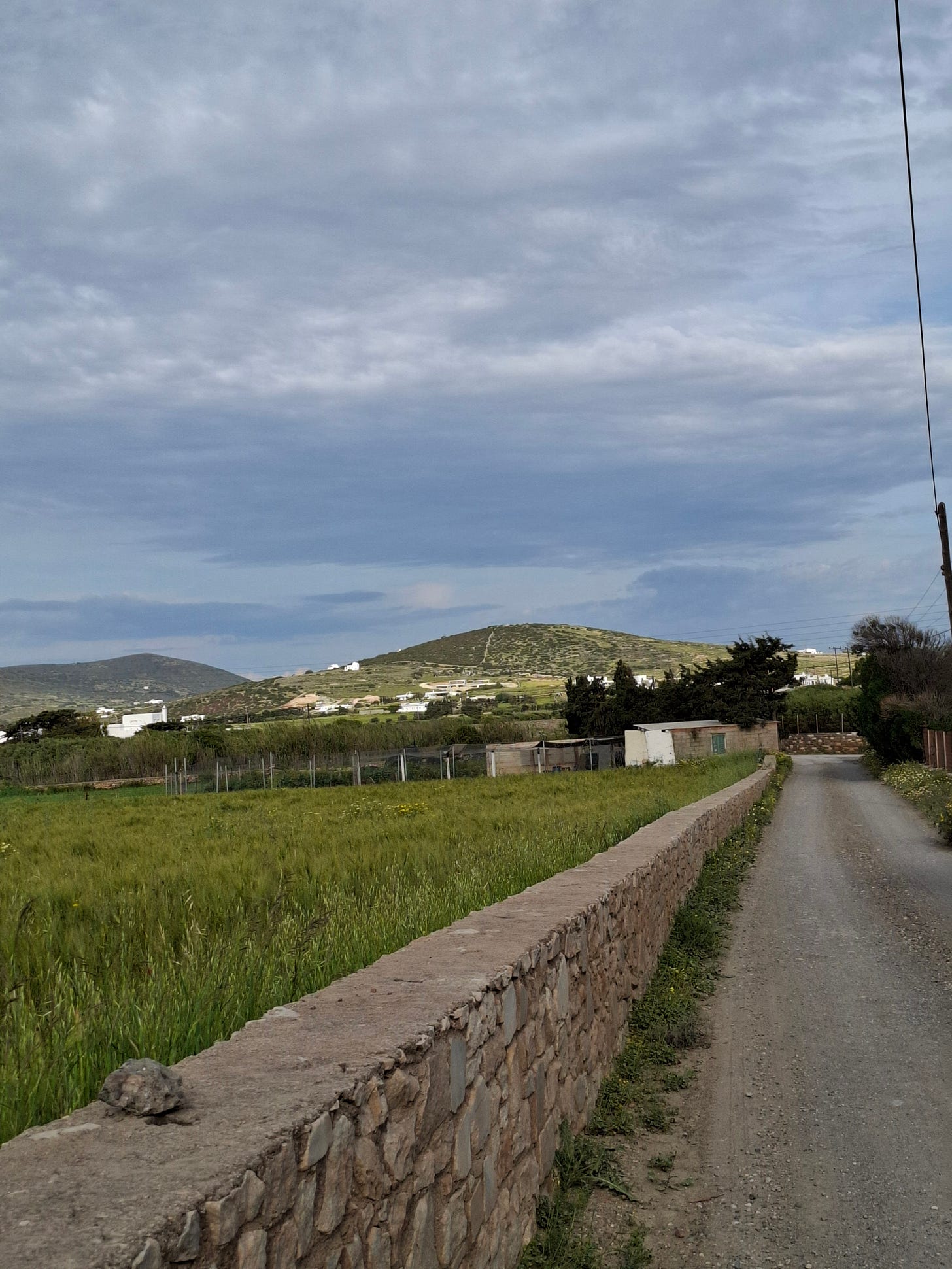Dear Family and Friends and Friends of Friends,
I came to Paros to teach because I feared I couldn’t teach. Memory had waned and words vanished before they became solid things in my mouth.
My father always hoped I would become a first-grade teacher because teachers had steady jobs and could always pay the rent. When I told him I wanted to be a poet, he asked, rhetorically and with suppressed anger leaking from the seams of his eyes, Whose gonna pay the rent? These words and that stare were not the encouragement a romantic sixteen-year-old needed to become any kind of writer, so when Professions Day came around in 12th grade, I chose social work. Writer, let alone poet, didn’t even make the list.
My first association with social work was a visit on Professions Day to an office in Saint Luke’s Hospital. The imposing faux Georgian red brick building was on Shaker Blvd., slightly west of the Shaker Square Rapid stop, my north star. All I recall from that visit was an office with files and tables and lots of papers. Perhaps social work wasn’t far from writing.
I earned a B.SW. in 1972, after a thirteen-month re-training course at the Hebrew University in Jerusalem, having been re-trained from a B.A. with Honors in American Culture (U of M), hardly credentials for serious work in Jerusalem. Slightly crazed by the Holy City’s light and history, I chose a type of social work on the opposite side of the craziness table. Jerusalem’s southern branch of the Ministry of Health’s Mental Health Clinic became my home for seven years and gave me enough material to begin writing on the side.
For decades, social work and writing vied for prominence, as if I were being forced to choose one or the other. For decades, I balanced both in a precarious acrobat, while balancing the needs of three children and a meat-and-potatoes husband. Circus skills, that’s what I should have studied in Ann Arbor.
I was a part-time social worker, part-time writer with no book, and full-time mother. Writing caused me more pleasure and less guilt than social working. It strengthened me as I practiced writing strong sentences. Writing helped me crack “the frozen sea” inside, as I cried my way into uncovering buried secrets hidden in buried caves. Writing liberated me from the false self and demanded I tell the truth, at least to myself. Writing was a ball point pen that raced across the page, forcing me to hold on so I wouldn’t fall off or down or out, pulling me to the sacred spot at the end of each sentence. After every writing episode, I needed a month or two or nine to rest and recover until my insides bubbled again and I agreed to let them out.
My father had been right. Such writing could never pay the rent, but what he didn’t know, is that it could make me a better person, a whole person with a distressed soul who needed to make sense of her feelings, fantasies, stories and dreams. These riches far outnumbered rent.
Since I was a slow reader and did not trust my own voice and had neither a mentor nor a teacher in Jerusalem and lived in a place where English was spoken only among Anglo immigrants, a place where no serious and accessible English library existed, I ordered pedagogical writing books from abroad. The first one was Writing Down the Bones by Natalie Goldberg. One day, nudged by my brother in Cleveland, I dared to ask the editor of the Women’s Page of The Jerusalem Post if she’d like a monthly column on mothering. She said Yes. Writing those columns was my first MFA. While teaching myself and learning who and what to read, I practiced teaching others.
After a 10-day residency at Goucher College’s Low-Residency MFA in Creative Nonfiction in 1999, I invited three friends to join me for a two-day writing retreat at Our Lady of the Ark of the Covenant Church compound in Abu Ghosh. My friends wanted to write and I gave them writing exercises. During the day we wrote together in a quiet alcove among the simple rooms geared for Catholic pilgrims. Late at night we wrote in our rooms, backs to the stark Latin cross on the wall. The ministering nuns appreciated our quiet presence. It was there that I discovered my love of teaching. I could be a teacher, not for first graders, but for adults like me who had the urge, the bug, the gift and the curse to write. Teaching was also the best way for me to learn.
With each academic degree in writing and with each mentor and publication and with each platform I created for people who wanted to write—The Writing Gym at Tmol Shilshom, The Writing Pad in Beit Zayit and Tel Aviv, retreats around Israel, mentoring published writers—my confidence grew. But in my mid-70s memory began to fail and lack of enthusiasm ensued.
After twenty years of teaching I was still a writer without a book. I stopped teaching and worked on completing the two books that had dominated my writing life over the fifty-plus years in Israel. Our Names Do Not Appear, a memoir and Bethlehem Road: Stories of Immigration and Exile finally got ISBNs, covers, blurbs, reviews and price tags.
My father was right about writing, or at least about me writing. Unless you have 30,000 friends on Facebook, it won’t pay the rent. Even then, it may not. But who wants 30,000 friends? Or even 10,000? I like the intimacy of small numbers and I still don’t write for the money. I’m in it for getting the story out of me and onto the page. I’m in it for emptying the cluttered attic of my mind and turning it into emotional gold. I am a supermarket for memories and dreams and I want to release them on the page to make way for new memories and dreams. Writing as cleansing, writing as breathing—inhale, exhale. Indeed, writing has cleansed me of the stubbornest obsessions that kept me stuck in the past, liberating me, finally, to be present in the present.
Then in 2024 Reva Mann, a writer friend who lives in Israel and Greece, invited me to Paros.
She had been nudging me to come to her beloved island for years, but I had no interest in leaving Tel Aviv or Haifa, even for a week. When she invited me, I hadn’t taught writing in five years and thought my teaching career was over. Now she wanted me to teach for six days at the Tao’s Retreat Center. It was a wacky idea, but as the war in Israel dragged on and the politics became more depressing, a week on a Greek island sounded more inviting.
Apparently, my former students had not forgotten me and ten writers came to Paros from Israel, England, the US and Paros. I prepared four months in advance. That’s how nervous I was about returning to teach. Would I remember their names? The names of favorite authors? Did I have what to say? I couldn’t remember plots of stories I read last week. Would my energy endure daily teaching, albeit three hours per day? It was a gamble.
Sitting around the wooden table in a room with four windows framed with white linen curtains, windows that overlooked fields of spring wildflowers, Mediterranean scrub, a turquoise sea and Naxos, the sister island to Paros in the distance, a glorious sky of Greek drama clouds, the only noise that of the wind swishing over the dry undergrowth and the sound of letters being pressed on a lone laptop, my body relaxed into the realm of reading, writing and teaching.
“Teacher” suggests too much distance between the teacher and the taught. Rather, I was sharing craft knowledge and writing experience I had acquired over the decades of writing reading and re-writing. This simple act of sharing inspired the wonderful adults in this group, many who were published writers and teachers themselves.
I thought of Tillie Olsen. I had seen her at a talk at the Jewish Community Center in Minneapolis in 1986. She seemed confused, forgetful and I felt pity for the great writer of “I stand here ironing . . ., ” the writer who defined all the situations that silenced women writers in the 20th century and before. She was seventy-four. I was forty-one and vowed that evening that I would quit writing, or at least talking about writing, when I became old. I was afraid of being like the confused Olsen in Paros, but I was wrong. Everyone’s memories were as inconsistent as mine and everyone—nine women and one man—were forgiving understanding and accepting.
I lead the group of writers through sentences long and short and then into whole paragraphs, from the cellular level of sounds to the feeling rendered in the heart. I demanded 100 percent concentration, not by saying Concentrate!, but by my enthusiasm for the subject matter, and lo and behold, my students concentrated, felt exhausted, but also inspired.
What more could a teacher want?
This magic happened on Paros, a Greek island low on trees, but rich in one and two story gleaming white homes, simplicity, generosity and a Greek zest for life, a place where wild spring daisies spawn smiles, a snob peacock struts its showy tail, a goat stands on its shaky insecure shed chewing dry grass, a lone horse chained at the pastern overlooks the dirt road, the writing trail on which we writers walk at dawn to Tao’s Retreat Center at the top of the hill and I, I am their teacher.
Yours, back in Israel,
Judy








Congratulations to you, Judy! it sounds so rewarding and personally enriching,
Thanks so much, Susan, for your continuous support.